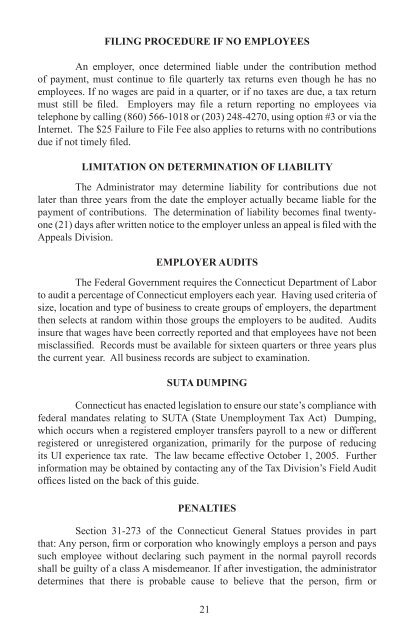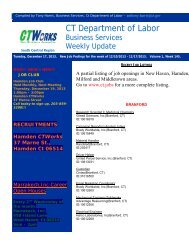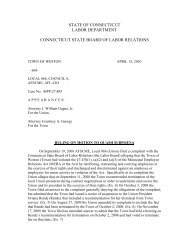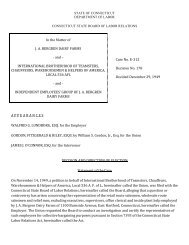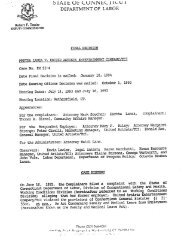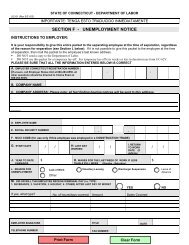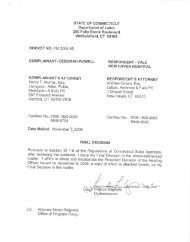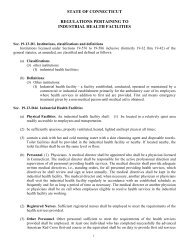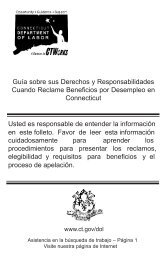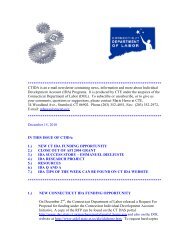Employer's Guide to Unemployment Compensation - Connecticut ...
Employer's Guide to Unemployment Compensation - Connecticut ...
Employer's Guide to Unemployment Compensation - Connecticut ...
Create successful ePaper yourself
Turn your PDF publications into a flip-book with our unique Google optimized e-Paper software.
FILING PROCEDURE IF NO EMPLOYEES<br />
An employer, once determined liable under the contribution method<br />
of payment, must continue <strong>to</strong> file quarterly tax returns even though he has no<br />
employees. If no wages are paid in a quarter, or if no taxes are due, a tax return<br />
must still be filed. Employers may file a return reporting no employees via<br />
telephone by calling (860) 566-1018 or (203) 248-4270, using option #3 or via the<br />
Internet. The $25 Failure <strong>to</strong> File Fee also applies <strong>to</strong> returns with no contributions<br />
due if not timely filed.<br />
LIMITATION ON DETERMINATION OF LIABILITY<br />
The Administra<strong>to</strong>r may determine liability for contributions due not<br />
later than three years from the date the employer actually became liable for the<br />
payment of contributions. The determination of liability becomes final twentyone<br />
(21) days after written notice <strong>to</strong> the employer unless an appeal is filed with the<br />
Appeals Division.<br />
EMPLOYER AUDITS<br />
The Federal Government requires the <strong>Connecticut</strong> Department of Labor<br />
<strong>to</strong> audit a percentage of <strong>Connecticut</strong> employers each year. Having used criteria of<br />
size, location and type of business <strong>to</strong> create groups of employers, the department<br />
then selects at random within those groups the employers <strong>to</strong> be audited. Audits<br />
insure that wages have been correctly reported and that employees have not been<br />
misclassified. Records must be available for sixteen quarters or three years plus<br />
the current year. All business records are subject <strong>to</strong> examination.<br />
SUTA DUMPING<br />
<strong>Connecticut</strong> has enacted legislation <strong>to</strong> ensure our state’s compliance with<br />
federal mandates relating <strong>to</strong> SUTA (State <strong>Unemployment</strong> Tax Act) Dumping,<br />
which occurs when a registered employer transfers payroll <strong>to</strong> a new or different<br />
registered or unregistered organization, primarily for the purpose of reducing<br />
its UI experience tax rate. The law became effective Oc<strong>to</strong>ber 1, 2005. Further<br />
information may be obtained by contacting any of the Tax Division’s Field Audit<br />
offices listed on the back of this guide.<br />
PENALTIES<br />
Section 31-273 of the <strong>Connecticut</strong> General Statues provides in part<br />
that: Any person, firm or corporation who knowingly employs a person and pays<br />
such employee without declaring such payment in the normal payroll records<br />
shall be guilty of a class A misdemeanor. If after investigation, the administra<strong>to</strong>r<br />
determines that there is probable cause <strong>to</strong> believe that the person, firm or<br />
21


